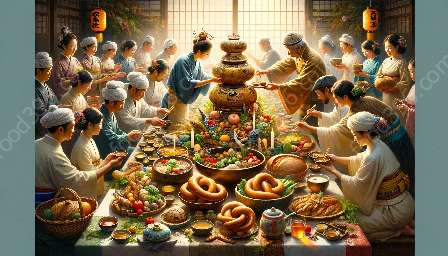Food is not just fuel for the body, it encompasses a rich tapestry of cultural beliefs and superstitions that have been passed down through generations. These beliefs and superstitions vary across different cultures and regions, shaping the way people prepare, consume, and even perceive food.
Exploring Cultural Beliefs and Superstitions
Cultural beliefs and superstitions surrounding food are deeply ingrained in our societies and often influence everyday practices. In many cultures, certain foods are associated with good luck, prosperity, and health, while others are believed to bring about misfortune or bad luck.
Symbolism in Food
Food often carries symbolic meanings that reflect cultural values and traditions. In some cultures, the act of sharing food is seen as a gesture of hospitality and unity, while certain dishes are reserved for special occasions and celebrations, symbolizing abundance and joy.
Food Rituals and Symbolism
Food rituals are an integral part of many cultures and often hold significant symbolic value. From traditional feasts to ceremonial offerings, the preparation and consumption of food play a central role in religious, spiritual, and social practices.
In some cultures, specific rituals surround the preparation and serving of meals, with symbolic gestures and prayers accompanying the act of eating. These rituals not only reinforce cultural identity but also establish a sense of community and belonging.
Food Symbolism in Festivals
Many festivals and celebrations are centered around food, each dish carrying its unique symbolism and significance. For example, during Lunar New Year in many Asian cultures, dumplings are consumed for their resemblance to gold ingots, symbolizing wealth and prosperity for the coming year.
Food Culture and History
The evolution of food culture is intertwined with historical events and societal changes, shaping the way people perceive and interact with food. Each culture has its unique culinary heritage, influenced by historical migrations, trade routes, and globalization.
Traditional cuisines often reflect the fusion of diverse cultural influences, demonstrating the interconnectedness of food and history. Furthermore, food serves as a storyteller of the past, preserving the traditions and customs of bygone eras.
Unearthing Culinary Traditions
Exploring the history of food reveals the intricate connections between culinary practices and cultural identity. From the traditional ingredients used in regional cuisines to the customs surrounding mealtime, food culture offers a glimpse into the soul of a society.
Concluding Thoughts
Cultural beliefs and superstitions surrounding food, along with food rituals, symbolism, culture, and history, represent the multifaceted nature of food in human society. By delving into these interconnected topics, we gain a deeper understanding of the role food plays in shaping our world, fostering unity, and preserving cultural heritage.

